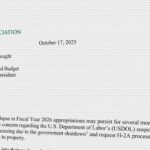The Alabama Department of Human Resources has announced that Supplemental Nutrition Assistance Program (SNAP) benefits will be temporarily halted in November due to the ongoing federal government shutdown.
According to DHR, the United States Department of Agriculture (USDA) issued guidance directing that SNAP benefits — commonly known as food stamps — be suspended effective November 1 until federal funding is restored or further instructions are provided to the states.
Officials confirmed that recipients can still use any benefits already issued to their Electronic Benefit Transfer (EBT) cards before November 1, 2025, at all authorized SNAP retailers.
“SNAP benefits are 100% federally funded; therefore USDA (FNS) controls the issuance of these benefits on EBT cards,” said Alabama DHR Commissioner Nancy Buckner.
“We know SNAP benefits are vitally important to the more than 750,000 Alabamians who depend on the more than $140 million in support each month. Alabama DHR, along with many others, hopes Congress will come to a quick resolution on the federal government shutdown.”
Roughly 15% of Alabama’s population is currently enrolled in SNAP. Data from the Center on Budget and Policy Priorities shows that nearly 70% of participants are families with children, around 40% are individuals with disabilities or older adults, and more than one-third are working families.
Meanwhile, the Women, Infants and Children (WIC) program will continue to operate as normal, according to the Alabama Department of Public Health (ADPH), which manages the program.
“Currently, all WIC services, including appointments, benefits issuance, and nutrition education, remain available statewide,” ADPH said in a statement to AL.com. “WIC and SNAP are different programs, and SNAP is not under the direction of ADPH. The only measure that ADPH has taken, at this time, is to move to a one-month benefit issuance frequency in order to continue serving our WIC Program participants.”
Last Friday, the USDA confirmed it will not use its contingency fund to cover SNAP benefits in November.
That fund holds about $6 billion, but the program requires around $8 billion per month to operate, according to the Center on Budget and Policy Priorities.
“The contingency fund is not available to support FY 2026 regular benefits, because the appropriation for regular benefits no longer exists,” stated a USDA letter obtained by USA Today.
Following the federal government shutdown on October 1, the USDA previously noted that it had enough funding to cover state administrative costs — similar to what was done during the 2018 and 2019 shutdowns.
DHR officials added that individuals can continue to apply for SNAP during the suspension. Current recipients must still complete recertifications, provide required documentation, and report as usual.
“These steps are of the utmost importance so DHR can submit each recipient’s benefit file as soon as the suspension is lifted; in other words, this will allow recipients to more quickly use their November funds in the grocery stores,” the agency said in its press release.
Feeding Alabama, a network of food banks across the state, encouraged residents impacted by the suspension to use its Food Finder tool online to locate nearby pantries and resources for assistance.



